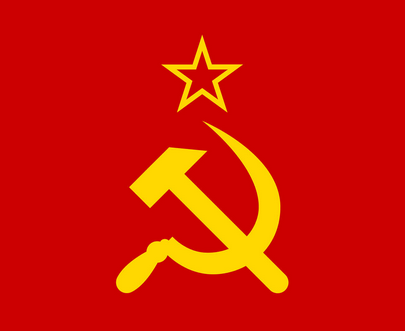It was established in 1922 as a union of four socialist republics created after the 1917 October Revolution, namely the Russian SFSR, the Transcaucasian SFSR, the Ukrainian SSR and Byelorussian SSR. The years that followed saw the addition of the Uzbek and Tajik SSRs; the Transcaucasian SFSR was dissolved in 1936 in favor of the elevated SSRs of Georgia, Armenia and Azerbaijan. From 1956 to 1991, the union comprised 15 member republics, two of which had their own member seats at the United Nations.
The USSR represented a groundbreaking political alternative for the working class as the first stable socialist state in history. This was remarkable especially in a time period where workers in the Western world were still struggling for basic union rights; the 1924 Soviet Constitution and the 1936 Soviet Constitution represented some of the most progressive political advancements in history.
The Soviet Union developed under extreme pressure from capitalist states and global imperialism; during the Russian Civil War, starting from 1918, it suffered successive invasions by Britain, France, the United States, Japan, Poland, and several other minor European powers. Some of these interventions temporarily succeeded in overthrowing local soviets and installing anti-communist puppet regimes, although they were ultimately unsuccessful in preventing the founding of the Soviet Union.
Barely two decades later, during World War II, the Nazi invasion represented the second imperialist war on the USSR, this time in the name of fascism. Although the fascists inflicted catastrophic damage on the western USSR and its population, the Red Army ultimately succeeded in repelling the Nazi forces and went on to play an integral role in the defeat of German Nazism in 1945.
Despite these difficulties, the Soviet Union achieved some of the most impressive economic developments in modern history. Socialism transformed a country of illiterate and starving peasants into an industrial superpower with one of the fastest growing economies on Earth. The Soviet people were one of the world's best-educated and healthiest populations, responsible for some of history's most impressive industrial and scientific achievements to date. And it provided a very influential model for other later socialist projects in places such as China, Cuba and Vietnam.
Starting from 1988, many SSRs seceded from the USSR before its illegal overthrow in 1991. Its past territory is now occupied by the successor states of Russia, Latvia, Lithuania, Estonia, Belarus, Ukraine, Pridnestrovie, Moldova, Georgia, Azerbaijan, Armenia, Artsakh, Abkhazia, South Ossetia, Kazakhstan, Uzbekistan, Turkmenistan, Tajikistan, and Kyrgyzstan.
Hexbear links
- 🐻Link to all Hexbear comms
- 📀 Come listen to music and Watch movies with your fellow Hexbears nerd, in Cy.tube
- 🔥 Read and talk about a current topics in the News Megathread
- ⚔ Come talk in the New Weekly PoC thread
- ✨ Talk with fellow Trans comrades in the New Weekly Trans thread
- 👊 Share your gains and goals with your comrades in the New Weekly Improvement thread
- 🧡 Disabled comm megathread
reminders:
- 💚 You nerds can join specific comms to see posts about all sorts of topics
- 💙 Hexbear’s algorithm prioritizes comments over upbears
- 💜 Sorting by new you nerd
- 🌈 If you ever want to make your own megathread, you can reserve a spot here nerd
- 🐶 Join the unofficial Hexbear-adjacent Mastodon instance toots.matapacos.dog
Links To Resources (Aid and Theory):
Aid:
Theory:


I peak at like 110-120 wpm with most of the work being done with 4 fingers, with my ring fingers reaching out for some of the keys the pinky is supposed to press.
Sometimes I wonder if I'd be faster if I'd learned the 'proper' way, attempts to learn other keyboard layouts always fizzle out because I suddenly start trying to use my pinkies and shit and my brain shuts down.
'WPM' is a weird figure because its very distinct experiences between copying, composing, and stenography that don't necessarily have the same rates of.. typistry? i can type extremely fast when inspired and agitated but i'm also extremely sensitive to getting quotations correct so copying/taking down what someone else says lags noticeably behind
Yeah I did some transcription work for bit and people talk fast. Assuming the recording was clear I'd still have to slow it down a good amount to keep up with just a normal conversational pace.
The only way to get a good idea of how fast your hands can go is just copying text on a screen, otherwise it's just how fast can your brain process shit.